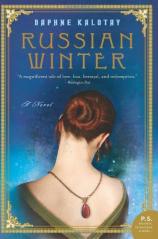Reading Group Guide
Discussion Questions
Russian Winter

1. How would you describe Nina Revskaya? What kind a person was she? Do you sympathize with the way events shaped the woman she became? And how would you compare her with Vera Borodina? What exactly was the nature of their friendship? What held them back from sharing their deepest secrets?
2. How does living in a repressive society like Stalin's Soviet Union affect human relationships? Can real trust ever be formed between friends, spouses, colleagues? What risks do people face in revealing their true nature?
3. Each piece of Nina's jewelry denotes a particular memory. Why do you think she waited so long to finally part with her jewels? Are there memories we have that are too painful to face, yet too dear to let go of? Do any of your possessions hold a special memory for you?
4. In your opinion, did Viktor Elsin truly love Nina? Did she love him? What about Gersh and Vera? What sacrifices were each willing to make for love?
5. After she defected, Nina believed she had shed the first third of her life. To what extent was this true? Can we ever truly rid ourselves of parts of our lives --- or ourselves --- that we don't like? What is the price of forgetting?
6. Nina cherished the solitude of her later years. "She relished the very texture of her privacy, its depth of space and freedom, much of an entire day hers alone. Her early life of always sharing, never a private moment or corner or closet shelf of her own, had left her hungry for this." Was her solitude a release, or was it a fortress she used to keep others --- and the past --- away?
7. Was Nina a victim of the society in which she was raised --- or a perpetrator of its worst abuses? Would her ambitions have eventually led her to behave the way her jealousy ultimately caused her to act? Was Nina's jealousy justified? Did Viktor, Gershstein, and Vera have a hand in their own demise? Are the choices Nina made forgivable?
8. Themes of art, politics, and love are intertwined throughout the novel. How do art and politics influence each other? Can art be a release from political oppression? In what ways can it be oppression's tool?
9. Can art flourish in a repressive state? How does repression influence the creation and expression of art? In a repressive state like the Soviet Union, must artistic success be accompanied by compromise? Compare the choices that Viktor, Nina, Gersh, and Vera made.
10. Were Gersh, Viktor and Vera radicals? What makes someone a dissident? Why do nations like the former Soviet Union insist on silencing all criticism?
11. What did art --- the ballet --- mean to Nina? Did she have to make a choice between dance and love? Could she have balanced both? What about women today? Have choices become easier or more difficult as opportunities for women have expanded?
12. Zoltan, also a refugee from the Iron Curtain, tells Grigori, "I remember before I left Hungary understanding completely that literature could save me as much as it could get me killed. Of course it's not like that here. But isn't it funny, that in some ways the price one pays for freedom of speech is…a kind of indifference." What does he mean by this? What do you think of his viewpoint? Must an artist suffer in some way to produce art?
13. After Nina defected to the West, she found she could not enjoy all of its freedoms. "Even when she tried to will it open, Nina's heart would not budge." Why couldn't she open herself up to new love and new friends? What held her back --- habit, or guilt?
14. What do you think of Drew Brooks? Do you see similarities between her and Nina? What are your impressions of Grigori Solodin? How are he and Nina alike?
15. What did Drew and Grigori offer each other that others could not? Do you think their personalities and experiences made them more attuned to Nina's unconscious longings and regrets?
16. Why did Nina refuse to see Grigori on the occasions he tried to contact her? How were their assumptions about each other wrong?
17. On their third anniversary, Viktor tells Nina, "love is all we have." But for Nina, it is dance and love. And years later, Grigori's colleague and friend Zoltan remarks, "There are only two things that really matter in life. Literature and love." Can art change the world --- change who we are? Can love? Has love or a passion transformed you or someone you know?
18. Have you ever met anyone who has lived under repressive circumstances? How did discovering their story affect you or your outlook?
19. Did Grigori ultimately have a better life --- though it was fraught with uncertainty --- because of Nina's selfishness? How might his experience have been different if he'd grown up in the Soviet Union rather than Europe and eventually America?
Russian Winter
- Publication Date: April 5, 2011
- Genres: Fiction, Historical Fiction
- Paperback: 496 pages
- Publisher: Harper Perennial
- ISBN-10: 0061962171
- ISBN-13: 9780061962172








